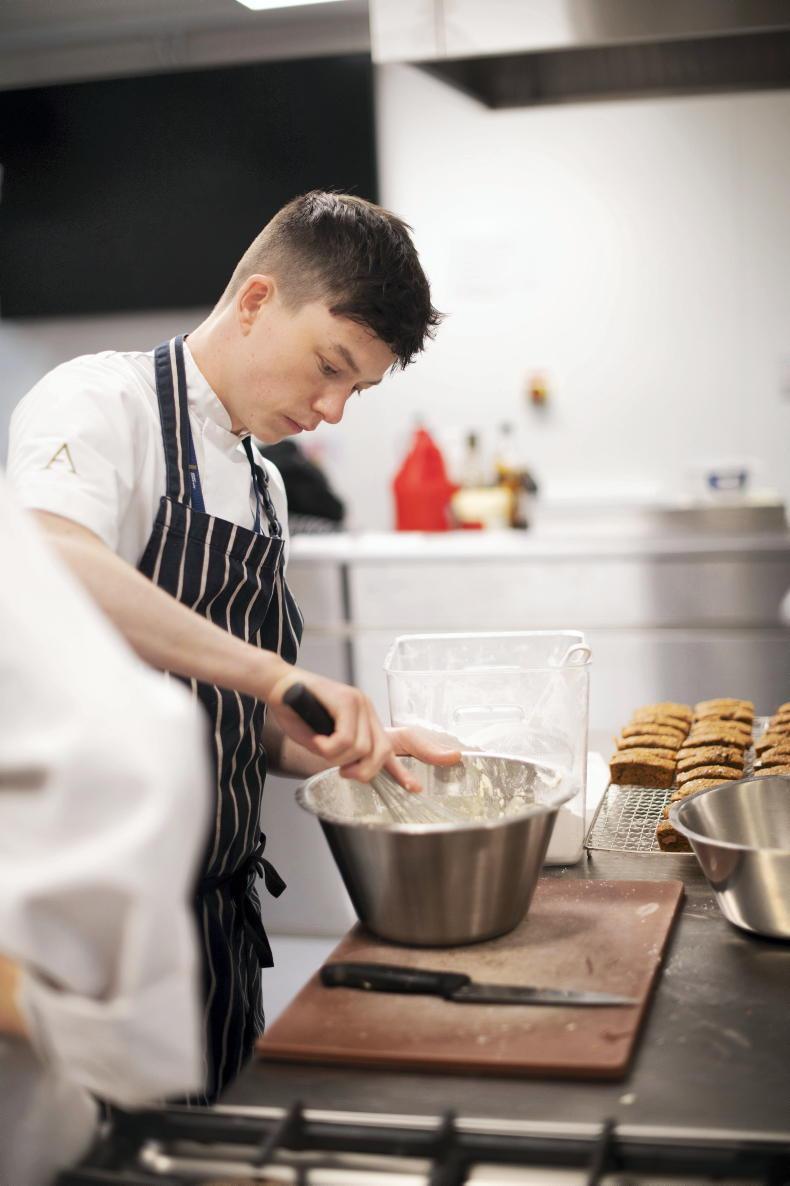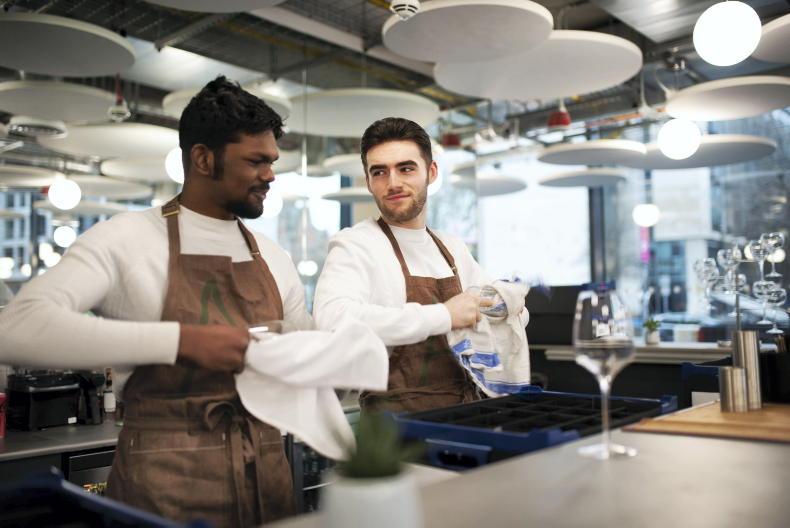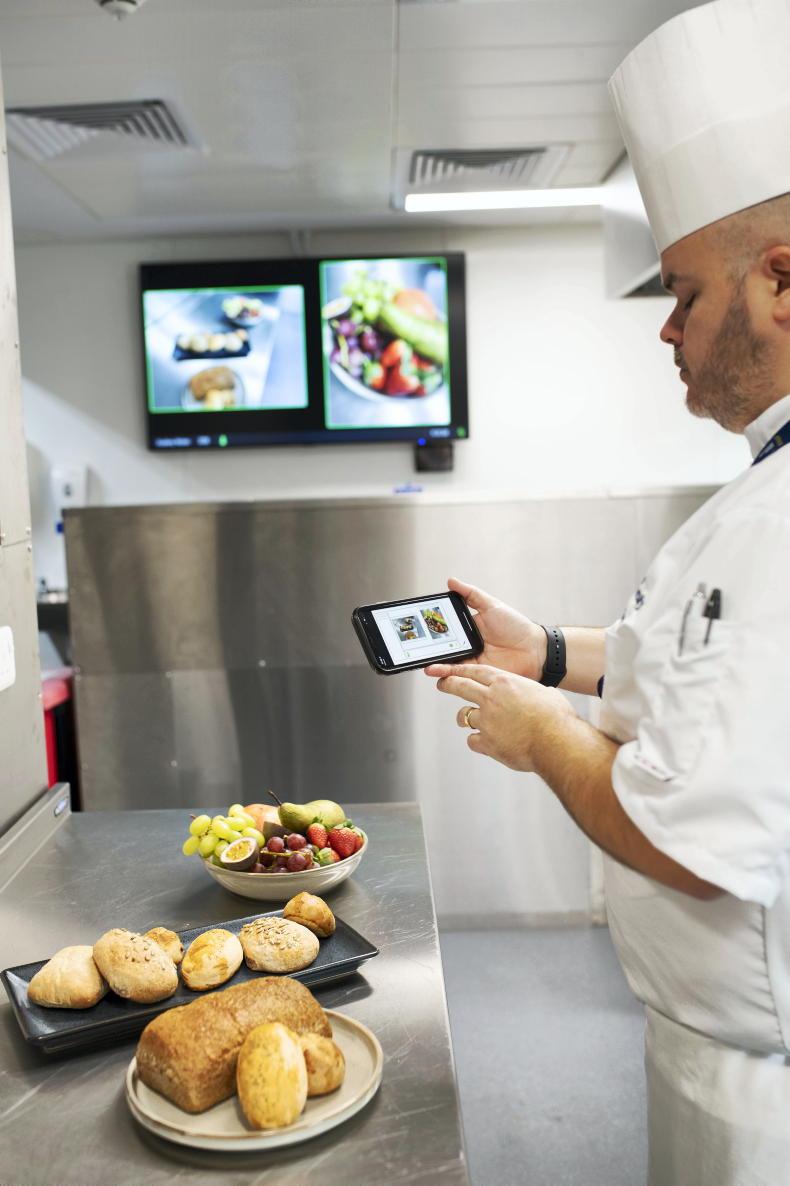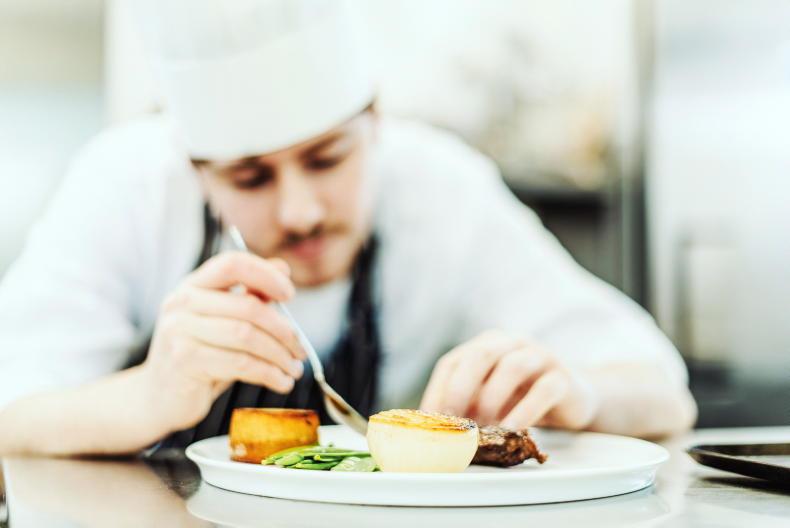Where do we see the future of Irish hospitality? What role does post-secondary education play in this? These are just a few of the topics discussed when I sat down with Professor Una McMahon-Beattie, who is head of Ulster University’s Department of Hospitality and Tourism Management.
Ireland, traditionally a very hospitable place, has gotten some bad press in recent times on hospitality. Hotel prices in Dublin have skyrocketed, causing leading travel publication Lonely Planet to warn against travelling there. In restaurants, hotels and tourism businesses throughout the country, staff shortages have, in some cases, caused business disruption.

At Academy restaurant in Belfast, student chefs put their practise into action as they run a working restaurant
Similar to farming, production and business input costs have increased due to inflation and the war in Ukraine. It isn’t an easy time to be working within the food, drink and hospitality industry.
Optimistic
In Northern Ireland, where Ulster University’s hospitality department operates across two of its campuses (Belfast and Coleraine), Brexit has brought additional challenges to the industry. Una, however, is optimistic about the future of tourism and hospitality in Northern Ireland. She feels Ulster University is particularly well-placed as a civic university to play a crucial role in its evolution and continued development.
“Ulster University has a commitment to food, drink and tourism. We see it as a very important sector in Northern Ireland,” she says. “We are really here to support the economy of Northern Ireland. It’s all about exploring the idea of food and drink being a transformative experience – transformative for people, for the economy and for society.

Academy restaurant in Belfast enables students to learn about every aspect of restaurant work, including front of house duties (pictured here)
“I think we’re going through a fairly challenging period with the Ukraine crisis and Brexit but I think what we have seen during the pandemic is that we’re very resilient. We saw lots of innovation and new business models developed and I think that is one of the key features which will drive the industry forward.”
Food innovation
Staying on top of these advances in innovation is the main focus of Ulster University’s Department of Hospitality and Tourism Management. This is to help drive Northern Ireland’s economy, but also to provide the best possible education for their students. Recently, the university launched its new centre for food, drink and culture, which includes its on-campus restaurant for culinary and hospitality students (Academy restaurant, Belfast campus).
Una’s department also launched its new biannual Gastronomy Summit, which took place in April 2022 and saw food and hospitality professionals come together to share ideas and best-practice for the industry.

With their approach to food innovation, hospitality students at Ulster University are encouraged to think in an entrepreneurial way
“My department deals with everything from food product concept right through to on-shelf in supermarket or in the Academy restaurant,” she said. “The Centre for Food, Drink and Culture has been developed by Ulster University as a sign of our commitment [to food, drink and hospitality]. It’s a substantial investment in the future of hospitality and culinary leadership.
“The summit was part of the launch of our centre, which acts as an immersive educational hub. At the summit we look at best-practice case studies, what other countries have done, share ideas and really just learn from each other.
“The idea was to inspire and enthuse students about every aspect of food, drink and hospitality from visiting local suppliers and producers to working with our favourite Irish, British chefs and international chefs so they get up close to people who can truly inspire them. When they get older, they’ll think of these key moments in their lives that [made them want to] stay with hospitality, culinary or tourism.”
Changing environment
This is all part of the end goal of Una’s department: to prepare students for the changing environment of food and hospitality. While interpersonal relations in hospitality are paramount, we also need to consider the role technology will play within the industry in the future. Una says the equipment within their product development labs (found on their Coleraine Campus) is giving students skills and experience to find meaningful work within food innovation.

Culinary students learn from leading industry chefs as well as their in-house professors
“We have a consumer insight lab, which is basically a virtual shop,” Una said. “We’re able to take food products, put them on a shelf and see how consumers will shop. So we look at consumer behaviour in terms of products. Whether that’s vegetables or a packet of bacon, we’re able to look at where it should be placed, what the labels should look like – all of those things – and we can do that in a virtual environment. We’re the only place on the island of Ireland which has such a facility and it does give us further insight into that whole area of consumer behaviour.

Una McMahon-Beattie is head of Ulster University's Department of Hospitality and Tourism Management.
“It is also about working with industry,” she says. “For example, we have students who work [with industrial partners] on developing new product pieces. We worked with McDonald’s, believe it or not. We tested their plant burger. So the students get actively involved in the development and testing pieces.”
Lots of options
Ulster University offers a range of undergraduate and postgraduate options for those interested in studying culinary arts, food innovation or hospitality. On the Belfast campus, Ulster University offers an undergrad BSc Hons in International Hospitality Management or a BSc Hons in Culinary Arts Management. On Coleraine campus, the university offers a BSc Hons in Consumer Management and Food Innovation and a new degree in the area of Food Business and Retail Management.Helping students develop an entrepreneurial side is important to the staff in the Department of Hospitality and Tourism Management as newer small food, drink and hospitality businesses help the region tell its story. This in turn creates enriching experiences for visitors and makes Northern Ireland an attractive place to live and work.
“The goal is about helping students unlock their entrepreneurial selves,” Una says. “We focus very much on providing opportunity and teaching in entrepreneurial ways, as well as delivering and using new pedagogic technique.”
More information
Learn more about the hospitality courses on offer at Ulster University at ulster.ac.uk/courses.
Read more
Careers profile: the future of agriculture and food science with Frank Monahan
New 12-week entrepreneurship course for those living with disability
Where do we see the future of Irish hospitality? What role does post-secondary education play in this? These are just a few of the topics discussed when I sat down with Professor Una McMahon-Beattie, who is head of Ulster University’s Department of Hospitality and Tourism Management.
Ireland, traditionally a very hospitable place, has gotten some bad press in recent times on hospitality. Hotel prices in Dublin have skyrocketed, causing leading travel publication Lonely Planet to warn against travelling there. In restaurants, hotels and tourism businesses throughout the country, staff shortages have, in some cases, caused business disruption.

At Academy restaurant in Belfast, student chefs put their practise into action as they run a working restaurant
Similar to farming, production and business input costs have increased due to inflation and the war in Ukraine. It isn’t an easy time to be working within the food, drink and hospitality industry.
Optimistic
In Northern Ireland, where Ulster University’s hospitality department operates across two of its campuses (Belfast and Coleraine), Brexit has brought additional challenges to the industry. Una, however, is optimistic about the future of tourism and hospitality in Northern Ireland. She feels Ulster University is particularly well-placed as a civic university to play a crucial role in its evolution and continued development.
“Ulster University has a commitment to food, drink and tourism. We see it as a very important sector in Northern Ireland,” she says. “We are really here to support the economy of Northern Ireland. It’s all about exploring the idea of food and drink being a transformative experience – transformative for people, for the economy and for society.

Academy restaurant in Belfast enables students to learn about every aspect of restaurant work, including front of house duties (pictured here)
“I think we’re going through a fairly challenging period with the Ukraine crisis and Brexit but I think what we have seen during the pandemic is that we’re very resilient. We saw lots of innovation and new business models developed and I think that is one of the key features which will drive the industry forward.”
Food innovation
Staying on top of these advances in innovation is the main focus of Ulster University’s Department of Hospitality and Tourism Management. This is to help drive Northern Ireland’s economy, but also to provide the best possible education for their students. Recently, the university launched its new centre for food, drink and culture, which includes its on-campus restaurant for culinary and hospitality students (Academy restaurant, Belfast campus).
Una’s department also launched its new biannual Gastronomy Summit, which took place in April 2022 and saw food and hospitality professionals come together to share ideas and best-practice for the industry.

With their approach to food innovation, hospitality students at Ulster University are encouraged to think in an entrepreneurial way
“My department deals with everything from food product concept right through to on-shelf in supermarket or in the Academy restaurant,” she said. “The Centre for Food, Drink and Culture has been developed by Ulster University as a sign of our commitment [to food, drink and hospitality]. It’s a substantial investment in the future of hospitality and culinary leadership.
“The summit was part of the launch of our centre, which acts as an immersive educational hub. At the summit we look at best-practice case studies, what other countries have done, share ideas and really just learn from each other.
“The idea was to inspire and enthuse students about every aspect of food, drink and hospitality from visiting local suppliers and producers to working with our favourite Irish, British chefs and international chefs so they get up close to people who can truly inspire them. When they get older, they’ll think of these key moments in their lives that [made them want to] stay with hospitality, culinary or tourism.”
Changing environment
This is all part of the end goal of Una’s department: to prepare students for the changing environment of food and hospitality. While interpersonal relations in hospitality are paramount, we also need to consider the role technology will play within the industry in the future. Una says the equipment within their product development labs (found on their Coleraine Campus) is giving students skills and experience to find meaningful work within food innovation.

Culinary students learn from leading industry chefs as well as their in-house professors
“We have a consumer insight lab, which is basically a virtual shop,” Una said. “We’re able to take food products, put them on a shelf and see how consumers will shop. So we look at consumer behaviour in terms of products. Whether that’s vegetables or a packet of bacon, we’re able to look at where it should be placed, what the labels should look like – all of those things – and we can do that in a virtual environment. We’re the only place on the island of Ireland which has such a facility and it does give us further insight into that whole area of consumer behaviour.

Una McMahon-Beattie is head of Ulster University's Department of Hospitality and Tourism Management.
“It is also about working with industry,” she says. “For example, we have students who work [with industrial partners] on developing new product pieces. We worked with McDonald’s, believe it or not. We tested their plant burger. So the students get actively involved in the development and testing pieces.”
Lots of options
Ulster University offers a range of undergraduate and postgraduate options for those interested in studying culinary arts, food innovation or hospitality. On the Belfast campus, Ulster University offers an undergrad BSc Hons in International Hospitality Management or a BSc Hons in Culinary Arts Management. On Coleraine campus, the university offers a BSc Hons in Consumer Management and Food Innovation and a new degree in the area of Food Business and Retail Management.Helping students develop an entrepreneurial side is important to the staff in the Department of Hospitality and Tourism Management as newer small food, drink and hospitality businesses help the region tell its story. This in turn creates enriching experiences for visitors and makes Northern Ireland an attractive place to live and work.
“The goal is about helping students unlock their entrepreneurial selves,” Una says. “We focus very much on providing opportunity and teaching in entrepreneurial ways, as well as delivering and using new pedagogic technique.”
More information
Learn more about the hospitality courses on offer at Ulster University at ulster.ac.uk/courses.
Read more
Careers profile: the future of agriculture and food science with Frank Monahan
New 12-week entrepreneurship course for those living with disability












 This is a subscriber-only article
This is a subscriber-only article










SHARING OPTIONS: